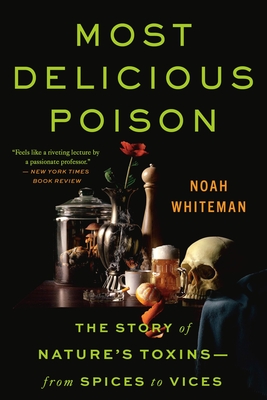Most Delicious Poison: The Story of Nature's Toxins--From Spices to Vices

Most Delicious Poison: The Story of Nature's Toxins--From Spices to Vices
An evolutionary biologist tells the story of nature's toxins and why we are attracted--and addicted--to them, in this "magisterial, fascinating, and gripping tour de force" (Neil Shubin).
A deadly secret lurks within our spice racks, medicine cabinets, backyard gardens, and private stashes. Scratch beneath the surface of a coffee bean, a red pepper flake, a poppy seed, a mold spore, a foxglove leaf, a magic-mushroom cap, a marijuana bud, or an apple seed, and we find a bevy of strange chemicals. We use these to greet our days (caffeine), titillate our tongues (capsaicin), recover from surgery (opioids), cure infections (penicillin), mend our hearts (digoxin), bend our minds (psilocybin), calm our nerves (CBD), and even kill our enemies (cyanide). But why do plants and fungi produce such chemicals? And how did we come to use and abuse some of them? Based on cutting-edge science in the fields of evolution, chemistry, and neuroscience, Most Delicious Poison reveals:- The origins of toxins produced by plants, mushrooms, microbes, and even some animals
- The mechanisms that animals evolved to overcome them
- How a co-evolutionary arms race made its way into the human experience
- And much more
This perpetual chemical war not only drove the diversification of life on Earth, but also is intimately tied to our own successes and failures. You will never look at a houseplant, mushroom, fruit, vegetable, or even the past five hundred years of human history the same way again.
PRP: 123.94 Lei
Acesta este Prețul Recomandat de Producător. Prețul de vânzare al produsului este afișat mai jos.
99.15Lei
99.15Lei
123.94 LeiLivrare in 2-4 saptamani
Descrierea produsului
An evolutionary biologist tells the story of nature's toxins and why we are attracted--and addicted--to them, in this "magisterial, fascinating, and gripping tour de force" (Neil Shubin).
A deadly secret lurks within our spice racks, medicine cabinets, backyard gardens, and private stashes. Scratch beneath the surface of a coffee bean, a red pepper flake, a poppy seed, a mold spore, a foxglove leaf, a magic-mushroom cap, a marijuana bud, or an apple seed, and we find a bevy of strange chemicals. We use these to greet our days (caffeine), titillate our tongues (capsaicin), recover from surgery (opioids), cure infections (penicillin), mend our hearts (digoxin), bend our minds (psilocybin), calm our nerves (CBD), and even kill our enemies (cyanide). But why do plants and fungi produce such chemicals? And how did we come to use and abuse some of them? Based on cutting-edge science in the fields of evolution, chemistry, and neuroscience, Most Delicious Poison reveals:- The origins of toxins produced by plants, mushrooms, microbes, and even some animals
- The mechanisms that animals evolved to overcome them
- How a co-evolutionary arms race made its way into the human experience
- And much more
This perpetual chemical war not only drove the diversification of life on Earth, but also is intimately tied to our own successes and failures. You will never look at a houseplant, mushroom, fruit, vegetable, or even the past five hundred years of human history the same way again.
Detaliile produsului










